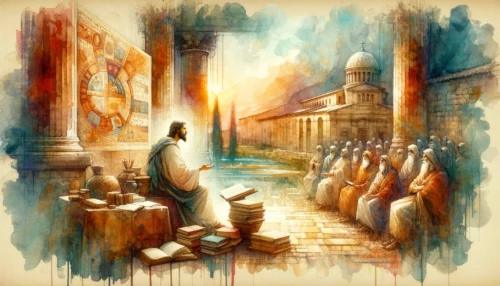From Genesis to Revelation, the pages of the Bible reveal a divine narrative that intertwines justice and mercy, severity and love. While the Old Testament seems to paint a picture of God as severe and punitive, the New Testament seems to present Him as more loving and gracious. This perceived dichotomy often raises the question: Is the God of the Old Testament different from the God of the New Testament?
Understanding God’s Nature: Justice and Love
From the very beginning of the Biblical narrative, God’s nature is described in multifaceted terms, illustrating a deity who embodies both justice and love. The Bible shows us that God is inherently just and righteous, upholding the moral order that He set in creation (Genesis 1-3). He is portrayed as the righteous judge, the supreme arbiter of right and wrong, who maintains the balance of moral order in the universe.
God is also depicted as a deity of immense love. His love is evident in His compassionate interactions with His creation. This love doesn’t negate His justice, but rather, it complements it. God’s justice and love can’t be separated from each other; they are two sides of the same coin.
This complexity of God’s nature is important in understanding His actions in both Testaments. God’s justice means that He cannot ignore sin; it has to be addressed and dealt with. This is evident in the Old Testament when God delivers the Israelites from Egypt, yet punishes them when they turn to idolatry (Exodus 14-32). Here, God is upholding justice – He is not being needlessly severe but is dealing with the moral disorder caused by sin.
God’s love compels Him to show mercy and extend grace, despite human sinfulness. A clear illustration of this love and mercy is found in the life of David, a man described as being after God’s own heart (1 Samuel 13:14). Despite David’s sin of adultery and murder, God forgave him and continued to use him for His purposes (2 Samuel 11-12).
God’s dual nature of justice and love is not limited to the Old Testament. In the New Testament, Jesus Christ, God incarnate, upheld the same dual nature. Jesus, while expressing love and forgiveness, also upheld justice. He was not afraid to denounce sin, such as when he rebuked the Pharisees for their hypocrisy (Matthew 23). At the same time, Jesus displayed God’s love, as seen in His sacrificial death on the cross, which paid the penalty for human sin and made possible reconciliation with God (Romans 5:6-8).
The Bible consistently portrays God as a being of justice and love. In His justice, He upholds moral order and responds to sin, which is clearly seen in the Old Testament. However, this justice doesn’t overshadow His love. God’s love and mercy extend to His creation, offering forgiveness and grace. This dual nature of God persists from the Old Testament through to the New Testament, presenting a consistent image of God throughout the Biblical narrative.
Interpreting God’s Actions in the Old Testament
The Old Testament is replete with instances where God’s actions might seem severe at first glance. To make sense of this, we must consider the context, the cultural setting, and God’s intentions behind His actions.
The story of the Flood in Genesis appears as a severe punishment where God wipes out almost all life on earth, saving only Noah and his family (Genesis 6-9). This act, while severe, can be seen as a response to the extent of human wickedness at the time. It signifies God’s commitment to uphold justice and maintain the moral order of His creation.
In the episode of the destruction of Sodom and Gomorrah (Genesis 18-19) God rains down destruction on the cities due to their inhabitants’ pervasive wickedness. This action is not a result of a capricious or harsh God but is rather a reflection of His commitment to justice and righteousness.
Even in these instances of judgment, God’s mercy is not absent. In the case of the Flood, God saves Noah and his family, ensuring the continuation of human life. In the case of Sodom and Gomorrah, God agrees to spare the cities if even a few righteous people can be found, highlighting His willingness to show mercy (Genesis 18:32).
In the context of Israel’s history, God’s actions often have direct links to the Israelites’ adherence or disobedience to His covenant. When they obey, they receive blessings and prosperity; when they disobey, they face consequences (Deuteronomy 28). God’s relationship with Israel thus reflects His nature as a covenant-keeping God who is just in His dealings.
The giving of the Law to Moses (Exodus 20), while it might seem restrictive, is an act of love. Through the Law, God provides the Israelites with guidelines for living in a way that aligns with His holiness. Following these guidelines enables them to maintain their relationship with God and live in peace and prosperity.
A careful reading of the Old Testament reveals that God’s seemingly severe actions are a reflection of His justice and commitment to uphold moral order. Instances like the Flood and the destruction of Sodom and Gomorrah, while appearing harsh, are responses to widespread wickedness. At the same time, God’s mercy is evident in His willingness to spare the righteous and in His patience with the people of Israel. The giving of the Law is an act of love, guiding the Israelites towards a life in alignment with God’s holiness.
The Continuity of God’s Character
The shift from the Old Testament to the New Testament does not represent a change in God’s character but rather unveils a more profound understanding of His nature.
Jesus Christ, God incarnate in the New Testament, embodied the same attributes of justice and love that God exhibited in the Old Testament. He proclaimed the Kingdom of God, called for repentance, and denounced sin, reflecting God’s justice (Mark 1:15; Matthew 23). Simultaneously, He healed the sick, fed the hungry, and forgave sinners, demonstrating God’s love (Matthew 14:14; Luke 7:48).
Jesus, as the ultimate revelation of God, didn’t represent a different deity from the Old Testament God. Instead, He fulfilled the Old Testament prophecies and revealed more fully the nature of God. The justice and love that were seen in separate instances in the Old Testament converge in the person of Jesus.
God’s faithfulness is another constant characteristic from the Old Testament to the New Testament. In the Old Testament, God promised to send a savior (Isaiah 53). In the New Testament, Jesus is presented as the fulfillment of this promise (John 1:29), showing God’s faithfulness to His word.
Even the sacrificial system set up in the Old Testament finds its ultimate fulfillment in the New Testament. The animal sacrifices in the Old Testament were a temporary solution to address the problem of sin (Leviticus 1-7). They pointed forward to the ultimate sacrifice of Jesus on the cross, which permanently dealt with the problem of sin (Hebrews 10:1-14).
God in the New Testament is not a different God from the Old Testament. The New Testament further unveils the nature of God, bringing into sharper focus the attributes of God that were already present in the Old Testament.
The New Testament does not present a different God from the Old Testament. Jesus, God incarnate, embodies the same attributes of justice and love that are seen in the Old Testament. God’s faithfulness remains constant, with Old Testament prophecies fulfilled in the New Testament. The sacrificial system set up in the Old Testament is fulfilled in Jesus’ ultimate sacrifice. The continuity in God’s character from the Old Testament to the New Testament indicates that God does not change.
Unveiling the Consistency of God’s Nature
From Genesis to Revelation, we encounter a God whose nature and attributes remain consistent throughout. The apparent dichotomy between a stern God in the Old Testament and a loving deity in the New Testament dissolves as we view the entire Biblical narrative as a whole. Both Testaments reveal a God who embodies justice and love, upholding righteousness while extending grace. This understanding serves to deepen our faith, appreciate the breadth of God’s character, and encourage us to be consistent in our walk with Him.
- How does understanding God’s consistency across the Testaments influence your perception of Him?
- What impact does this continuity in God’s nature have on your Christian faith?
- How might this knowledge about God’s unchanging character affect your personal relationship with Him?
Let us find strength and assurance in the consistency of our God. His unchanging nature is a testament to His unwavering commitment to us. In every season of life, we serve a God who is the same yesterday, today, and forever. His justice and love stand firm, offering us a foundation on which we can anchor our faith.














